
England vs India, 2nd Test: A Historic Triumph for India at Edgbaston
The second Test of the India tour of England 2025, played from July 2 to July 6 at Edgbaston, Birmingham, was a landmark encounter in the five-match Anderson-Tendulkar Trophy series. Following a chastening five-wicket defeat in the first Test at Leeds, India, led by new captain Shubman Gill, delivered a commanding performance to secure a 336-run victory, leveling the series at 1-1. This match marked India’s first-ever Test win at Edgbaston, a venue where they had lost seven of eight previous encounters, earning it the moniker “Fortress Edgbaston” for England. With standout performances from Gill’s record-breaking batting and Akash Deep’s maiden ten-wicket haul, the match showcased India’s resilience and tactical acumen, setting the stage for an electrifying series.
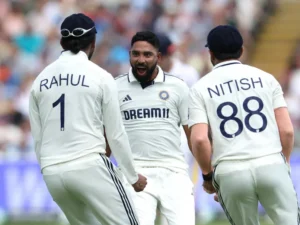 Coming off a loss at Headingley, where India squandered a strong position due to six dropped catches and lower-order collapses, the pressure was on Shubman Gill’s squad to rebound. The team faced scrutiny for their bowling selections, particularly with ace pacer Jasprit Bumrah rested for workload management, replaced by debutant Akash Deep. India opted for a balanced attack, including all-rounders Washington Sundar and Nitish Kumar Reddy alongside Ravindra Jadeja, Mohammed Siraj, and Prasidh Krishna, aiming to address their bowling frailties on a batting-friendly Edgbaston pitch. England, under Ben Stokes and coach Brendon McCullum, stuck with an unchanged XI, banking on their “Bazball” philosophy of aggressive cricket, despite Jofra Archer’s absence. The pitch, expected to favor batsmen but with potential for seam movement, and a forecast predicting rain on days four and five, added intrigue to the contest.
Coming off a loss at Headingley, where India squandered a strong position due to six dropped catches and lower-order collapses, the pressure was on Shubman Gill’s squad to rebound. The team faced scrutiny for their bowling selections, particularly with ace pacer Jasprit Bumrah rested for workload management, replaced by debutant Akash Deep. India opted for a balanced attack, including all-rounders Washington Sundar and Nitish Kumar Reddy alongside Ravindra Jadeja, Mohammed Siraj, and Prasidh Krishna, aiming to address their bowling frailties on a batting-friendly Edgbaston pitch. England, under Ben Stokes and coach Brendon McCullum, stuck with an unchanged XI, banking on their “Bazball” philosophy of aggressive cricket, despite Jofra Archer’s absence. The pitch, expected to favor batsmen but with potential for seam movement, and a forecast predicting rain on days four and five, added intrigue to the contest.
Day 1: India’s Strong Start
England captain Ben Stokes won the toss and elected to bowl, hoping to exploit early conditions with the Dukes ball. India, however, seized control, finishing the day at 310/5 in 85 overs, led by Shubman Gill’s unbeaten 114 and a 99-run partnership with Ravindra Jadeja (41*). Yashasvi Jaiswal contributed a brisk 87, narrowly missing a century, while Karun Nair added 31. England’s bowlers, led by Chris Woakes (2 wickets), struggled to break through, with Josh Tongue, Ben Stokes, and Shoaib Bashir each claiming a single wicket. Gill’s composed century, his second as captain, showcased his growing authority, while Jadeja’s resilience steadied the innings after Nitish Reddy and Rishabh Pant fell cheaply. The day set a dominant tone for India, capitalizing on a flat pitch despite England’s short-ball tactics.
 Day 2: Gill’s Historic Knock
Day 2: Gill’s Historic Knock
India continued their batting dominance on day two, posting a mammoth 587 in their first innings, powered by Gill’s monumental 269 off 387 balls—the highest score by an Indian captain in Test history, surpassing Virat Kohli’s 254*. Ravindra Jadeja (89) and Washington Sundar (42) provided crucial support, with their 144-run seventh-wicket stand frustrating England. Josh Tongue dismissed Gill with a telegraphed short ball, and Shoaib Bashir claimed his first wicket, but India’s total was the highest England had conceded in the Stokes-McCullum era. England’s reply began shakily, reaching 77/3 at stumps, trailing by 510 runs. Akash Deep struck early, removing Joe Root for 6, while Harry Brook (30*) and Ollie Pope weathered India’s probing new-ball attack. Gill’s 269, laced with 12 fours, and his fielding efforts underscored his leadership.
Day 3: England’s Fightback and Siraj’s Strike
Day three saw England mount a counterattack, driven by a 303-run sixth-wicket partnership between Jamie Smith (184*) and Harry Brook (158). Smith’s scintillating knock, surpassing Alec Stewart’s record for the highest score by an English wicketkeeper, and Brook’s fluent century kept England in the fight. However, Mohammed Siraj’s fiery spell turned the tide, claiming a six-wicket haul (6/70) as England collapsed from 386/5 to 407, losing their last five wickets for 20 runs. Akash Deep supported with 4/88, dismissing key batsmen. India’s second innings began cautiously, reaching 64/1 by stumps with a 244-run lead, as KL Rahul (28*) and Karun Nair (7*) survived after Yashasvi Jaiswal’s dismissal for 28. Siraj’s spell and India’s disciplined bowling ensured they retained control despite England’s resistance.
 Day 4: India Set a Daunting Target
Day 4: India Set a Daunting Target
India’s second innings saw Gill continue his run-fest, scoring 161 off 162 balls for a match tally of 430 runs, the most by an Indian in a single Test, surpassing Sunil Gavaskar’s 344. Ravindra Jadeja (69*) and Rishabh Pant (65) accelerated after Tea, with KL Rahul adding 55. India declared at 427/6, setting England a world-record target of 608. England’s chase began poorly, with Akash Deep and Mohammed Siraj dismantling the top order. By stumps, England were 72/3, needing 536 runs, with Joe Root and Harry Brook at the crease. India’s aggressive declaration and tight bowling, despite a dropped catch by Zak Crawley off Pant, put them firmly in the driver’s seat.
Day 5: Akash Deep’s Heroics Seal Victory
Rain delayed the start by over an hour, with play beginning at 5:10 PM IST. India needed seven wickets, and Akash Deep delivered a career-defining performance, finishing with 6/99 for a match haul of 10 wickets, only the second Indian to achieve this in England since Chetan Sharma in 1986. He dismissed Ollie Pope and Harry Brook early, exploiting a worn pitch with vicious seam movement. Washington Sundar removed Ben Stokes (33) via an lbw, and Jamie Smith fell for 88, caught by Gill, who fittingly took the match-winning catch off Akash Deep’s bowling. England were bowled out for 271, handing India a 336-run victory—their biggest overseas win by runs. The final session saw India wrap up the tail efficiently, with Prasidh Krishna and Ravindra Jadeja contributing wickets.
 Key Performances and Milestones
Key Performances and Milestones
- Shubman Gill: Earned Player-of-the-Match for his 430 runs (269 and 161), breaking Virat Kohli’s record for the highest score by an Indian captain and Sunil Gavaskar’s record for most runs in a Test. His leadership and fielding, including the final catch, were pivotal.
- Akash Deep: His maiden five-wicket haul (6/99) and ten-wicket match crusade (10/187) marked him as a standout performer, exploiting English conditions masterfully.
- Mohammed Siraj: Claimed 6/70 in England’s first innings, outbowling his counterparts and setting up India’s lead.
- Jamie Smith: His 184* set a new record for an English wicketkeeper, though it couldn’t prevent defeat.
- Harry Brook: Scored 158, forming a 303-run stand with Smith, but fell to Akash Deep on day five.
- Ravindra Jadeja: Contributed 89 and 69*, becoming the first player with 2,000 runs and 100 wickets in WTC history.
India’s decision to rest Jasprit Bumrah raised eyebrows, but Akash Deep’s performance justified the gamble. Their strategy of playing two spinners (Jadeja and Sundar) and three all-rounders bolstered batting depth, countering the flat pitch. England’s Bazball approach faltered under pressure, with Brendon McCullum admitting the pitch didn’t improve for batting as expected, and their bowlers struggled to match India’s seam attack. A minor controversy arose over Stokes’ argument with umpire Sharfuddoula over a 15-second timer on a DRS call, but it had little impact. England’s failure to capitalize on India’s 200/5 in the first innings and their own 80/5 in the second was a turning point, as noted by Stokes.
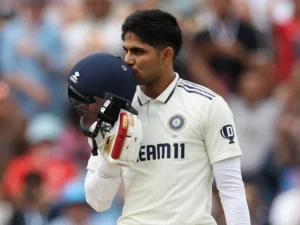 The victory was celebrated across India, with X posts from @BCCI, @ANI, and @cricanandha hailing it as a historic breach of “Fortress Edgbaston.” Fans praised Gill’s “magnificent” leadership and Akash Deep’s “6-fer,” with former selector Sarandeep Singh calling it a “tremendous victory.” The win, India’s first at Edgbaston, marked them as the first Asian team to triumph there, boosting morale after a string of losses. England’s Bazball philosophy faced scrutiny, with Michael Vaughan suggesting a draw might have been a wiser target, highlighting tactical maturity. The match’s high-scoring nature—1,692 runs—underscored the evolving dynamics of Test cricket, with India’s adaptability shining through.
The victory was celebrated across India, with X posts from @BCCI, @ANI, and @cricanandha hailing it as a historic breach of “Fortress Edgbaston.” Fans praised Gill’s “magnificent” leadership and Akash Deep’s “6-fer,” with former selector Sarandeep Singh calling it a “tremendous victory.” The win, India’s first at Edgbaston, marked them as the first Asian team to triumph there, boosting morale after a string of losses. England’s Bazball philosophy faced scrutiny, with Michael Vaughan suggesting a draw might have been a wiser target, highlighting tactical maturity. The match’s high-scoring nature—1,692 runs—underscored the evolving dynamics of Test cricket, with India’s adaptability shining through.
India faced criticism for their cautious approach on day four, with Gill and Jadeja slowing down before accelerating, potentially risking time management with rain looming. England’s bowlers, particularly Josh Tongue and Shoaib Bashir, were criticized for inconsistency, with Tongue’s loose spells and Bashir’s lone wicket drawing attention. The flat pitch and soft Dukes ball frustrated both teams, with Gill noting it diminished the fun of Test cricket. Rain delays on day five tested India’s patience, but their bowlers’ discipline ensured victory.
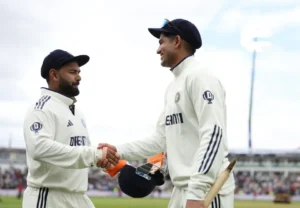 The second Test at Edgbaston was a defining moment for Shubman Gill’s young captaincy, with his 430 runs and Akash Deep’s ten-wicket haul leading India to a historic 336-run victory. The match showcased India’s ability to overcome selection risks and a challenging pitch, leveling the series and setting up a thrilling third Test at Lord’s. England, despite valiant efforts from Smith and Brook, couldn’t match India’s bowling prowess, exposing vulnerabilities in their Bazball approach. As both teams prepare for Lord’s, with Jasprit Bumrah and Jofra Archer set to return, this match will be remembered as a testament to India’s resilience and a turning point in the 2025 Anderson-Tendulkar Trophy.
The second Test at Edgbaston was a defining moment for Shubman Gill’s young captaincy, with his 430 runs and Akash Deep’s ten-wicket haul leading India to a historic 336-run victory. The match showcased India’s ability to overcome selection risks and a challenging pitch, leveling the series and setting up a thrilling third Test at Lord’s. England, despite valiant efforts from Smith and Brook, couldn’t match India’s bowling prowess, exposing vulnerabilities in their Bazball approach. As both teams prepare for Lord’s, with Jasprit Bumrah and Jofra Archer set to return, this match will be remembered as a testament to India’s resilience and a turning point in the 2025 Anderson-Tendulkar Trophy.

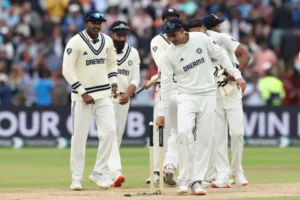 Day 2: Gill’s Historic Knock
Day 2: Gill’s Historic Knock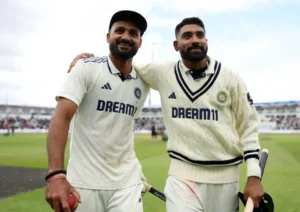 Day 4: India Set a Daunting Target
Day 4: India Set a Daunting Target Key Performances and Milestones
Key Performances and Milestones